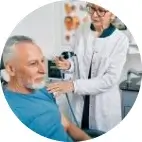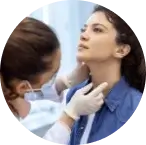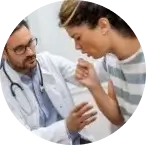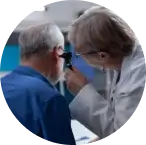Hemorrhoids, also known as piles, are swollen and inflamed blood vessels in the rectum and anus. They can cause discomfort, pain, and bleeding. Hemorrhoids can be internal, external, or a combination of both. Here are some key points about hemorrhoids.
Types of Hemorrhoids
- Internal Hemorrhoids: These occur inside the rectum and are usually painless. However, they can cause bleeding during bowel movements.
- External Hemorrhoids: These are under the skin around the anus and can be felt as a lump. They can be painful and may cause bleeding when irritated or during bowel movements.
- Thrombosed Hemorrhoids: When blood pools in an external hemorrhoid and forms a clot, it can become extremely painful. This condition is known as thrombosed hemorrhoids.
Common Symptoms
- Rectal bleeding during bowel movements is often seen as bright red blood on toilet paper or in the toilet bowl.
- Itching or irritation in the anal area.
- Pain or discomfort, especially during bowel movements.
- A feeling of fullness or discomfort in the rectum.
- A lump or swelling near the anus in the case of external hemorrhoids.
Causes
- Increased pressure on the rectal and anal blood vessels, which can be caused by straining during bowel movements, chronic constipation or diarrhea, obesity, and pregnancy.
- Aging, as the tissues supporting the blood vessels in the rectum and anus may weaken over time.
Prevention and Self-Care
- Eating a high-fiber diet to soften stools and prevent straining during bowel movements.
- Drinking plenty of water to stay hydrated.
- Avoiding prolonged sitting on the toilet.
- Engaging in regular physical activity.
- Over-the-counter creams or ointments, warm baths, and moist towelettes can provide relief for mild symptoms.
Medical Treatment
- A healthcare provider may recommend over-the-counter medications or prescribe topical creams or suppositories for symptom relief.
- In some cases, procedures such as rubber band ligation, sclerotherapy, or infrared coagulation may be recommended to treat internal hemorrhoids.
- External hemorrhoids that become thrombosed may require surgical removal.
Seeking Medical Advice
- If you experience rectal bleeding, it’s essential to consult a healthcare provider to rule out other more serious conditions, such as colorectal cancer.
- Persistent or severe symptoms, or if you suspect you have a thrombosed hemorrhoid, should prompt a visit to a healthcare professional for evaluation and appropriate treatment.
Hemorrhoids are a common condition and can usually be managed effectively with lifestyle changes and conservative treatments. However, it’s essential to seek medical advice from a Los Angeles hemorrhoids specialist, Armen Gregorian, MD, if you have symptoms to ensure proper diagnosis and treatment.
HOW WE WORK
1

Fill The Form

2

Book An Appointment

3

Check-Ups

4
